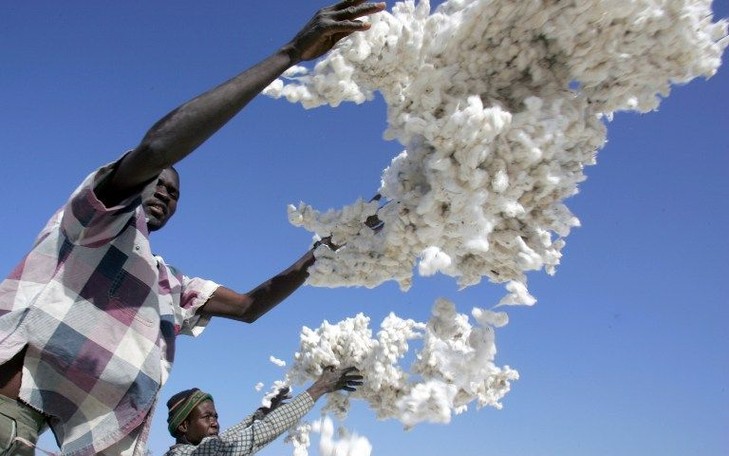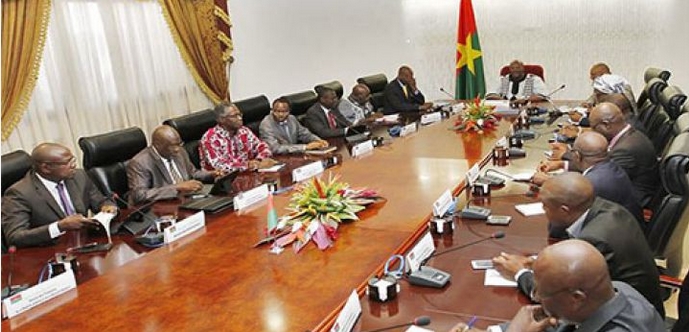… but does not break off from Monsanto
On February 2nd this year we published our newsletter 502) Burkina Faso abandons GMO cotton
We have received several messages asking if this is not merely a rumour, since there has been no confirmation from Burkina’s government. Today however the news has been confirmed at the highest level, as follows:
Last week the President of Burkina, Roch Marc Christian Kaboré, explained ” The cotton fibre that we produce today has become short and is therefore more difficult to spin, with the result that the market has become less interesting for us.
He referred to a statement by the Professional association of the cotton sector of Burkina, AICB (Association Interprofessionnelle du coton du Burkina), which has decided to go back to 100% conventional cotton, confirmed on April 5th by Wilfried Yaméogo, Managing director of the country’s major cotton company SOFITEX.
And there are also the minutes of the Council of Ministers of April 13, 2016
“The Council adopted a report on the partnership with the Monsanto firm on genetically modified cotton (GMC) in Burkina Faso and the preparation of the forthcoming cotton season 2016/2017.
The partnership with the Monsanto firm has enabled us to experi ment with Bt cotton since 2003. The results at the end of the experimental period are not positive, as the length of the Bt cotton fibre after ginning has deteriorated and no longer corresponds to the needs of the market.
This situation is the cause of the loss of our ”cotton from Burkina” label (high quality fibre) on the world market and the problems throughout our cotton sector. The Council has authorised the minister in charge, in cooperation with all those involved in our cotton production and trade, to start a gradual and substantial reduction of GMO cotton fields for a return to conventional cotton cultivation. ” (End of quote)
«That is one battle we have won », Christian Legay is pleased to declare, representing the National Council of organic agriculture, which has affiliates of consumer and farmer organisations and runs campaigns for a moratorium of 5 to 10 years on GMOs in Burkina.
However, President Kaboré told the news agency AFP that the country would pursue its discussions with Monsanto.”
Some people hope for compensation from the American giant, which is now betting its fortunes on a new variety of biotech cotton for the 2020/2021 season.
 Georges Yaméogo, technical advisor at Sofitex, affirms that there is no break off from Monsanto. ”If they find a solution in 3, 4 or 5 years, there is no reason no to return to GMOs. What we have at present is a tactical step back, not a full-blown rejection of GMOs.”
Georges Yaméogo, technical advisor at Sofitex, affirms that there is no break off from Monsanto. ”If they find a solution in 3, 4 or 5 years, there is no reason no to return to GMOs. What we have at present is a tactical step back, not a full-blown rejection of GMOs.”
For Christian Legay the worry at present is the ongoing experiments with cereals at Monsanto, notably on maize, sorghum and nimbé.
”However”, he emphasises, ”the fact that Burkina has given up the GMO cotton is an important warning signal to other African countries, tempted or pushed by the American administration and courted by agribusiness corporations.”
Is the idyllic cooperation between Sofitex, INERA and Monsanto definitely over? Has the end of the Compaoré era or the vast popular demonstrations paved the way for expressions of discontent? There is every indication that war has been declared …on GMO cotton. But the door has not been finally shut. The AICB has indeed called upon the cotton farmers to quickly move away from GMO Bt cotton and revert to conventional cotton … but only so long as there are no offers at hand of new Bt seeds, that would correct the defects of those currently on the market.
Let us not forget that Burkina Faso has started working on GMO maize, niebé and sorghum with the support of the Bill and Melinda Gates foundation (cf. See Info’OGM, April 7, 2016)
Note that the foundation holds 500 000 shares in the Monsanto corporation . . .
There is no doubt that the services of an agronomist/engineering research scientist of Burkina is less expensive than an American colleague !
Koudougou, April 15th, 2016
Maurice Oudet
Director SEDELAN










